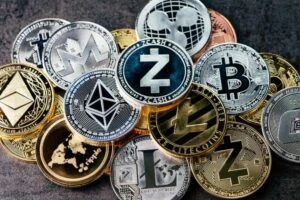Jun 14, 2023 05:05
Because of its
potential to disrupt different industries, blockchain technology has received a
lot of interest in recent years. Gaming and virtual reality (VR) are two
industries that promise to benefit substantially from blockchain.
Blockchain's
decentralized structure and unique characteristics have the potential to
transform the way games are made, distributed, and played, providing exciting
prospects for both developers and users. In this article, we will look at how
blockchain technology has the potential to change the gaming and virtual
reality industries.
Ownership
Enhancement and Digital Asset Management
Blockchain
technology has the potential to empower gamers by granting them actual
ownership and control over in-game assets. Traditionally, players spend time
and money obtaining virtual objects within a game, such as guns, skins, or
virtual real estate. They do, however, have limited ownership rights and are
frequently unable to transfer or sell these goods outside of the game's
ecosystem.
Through
non-fungible tokens (NFTs), players can have verified ownership of digital
assets using blockchain. Because NFTs are one-of-a-kind tokens that represent a
single item or piece of content, they are suitable for representing virtual
assets in games.
On blockchain-based
markets, players can trade, sell, or even lend their NFT-based assets,
resulting in a thriving secondary market for digital items. This new ownership
paradigm provides value to participants' investments while also allowing for
greater flexibility and autonomy.
Transactions
that are both transparent and secure
Within gaming
environments, blockchain technology offers transparent and secure transactions.
In-game transactions can be automated and validated using smart contracts,
which are self-executing contracts with predefined conditions. This eliminates
the need for intermediaries while also lowering transaction costs and ensuring
transparency.
Blockchain-based
markets, for example, can ease peer-to-peer transactions between players by allowing
smart contracts to automatically transfer ownership and payments when
predetermined conditions are met. This creates a trustless environment,
reducing the possibility of fraud and assuring fair transactions.
Play-to-Earn
Possibilities
Blockchain introduces
the concept of play-to-earn, in which users can earn real-world value by
participating in in-game activities. Game creators can establish economies
where players can earn bitcoins or other digital assets by engaging in the game
and reaching specific milestones by leveraging blockchain's transparent and
secure architecture.
This provides
new opportunities for players to monetize their abilities and time spent
playing games. Players can start their own businesses by developing and selling
in-game content, offering services, or competing in competitive gaming
tournaments with prize pools supported by blockchain-based crowdfunding.
recreation-to-earn models have the potential to economically empower gamers by
blurring the distinction between work and recreation.
Development
that is decentralized and driven by the community
Blockchain
technology can aid in the development of decentralized and community-driven
games. In traditional game production, choices are frequently taken by a small
number of developers and publishers. As a result, there may be a lack of
innovation, a lack of player participation, and a gap between developers and
their audience.
Blockchain-based
platforms enable decentralized game production, allowing developers to work directly
with players, leveraging the gaming community's combined intelligence and
creativity. Players may contribute to game development decisions, vote on
proposals, and even receive rewards for their participation thanks to
tokenization and decentralized governance. This more democratic approach
encourages creativity, variety, and a better sense of community.
Cross-game
Interoperability and Experiences
Blockchain
technology enables cross-game experiences and asset transfers by allowing
interoperability across different games and virtual worlds. Traditionally, each
game functions independently, and transferring assets between games is
difficult, if not impossible. Players can use blockchain to seamlessly move
their digital assets between games, resulting in a unified gaming experience.
A sword gained
in one game, for example, may be wielded in another, or a rare skin obtained in
one virtual world could be worn in another. This interoperability raises the
value and utility of assets, promotes user engagement, and stimulates
collaboration among game developers.
Combating
Fraud and Cheating
Cheating and
fraud have always been a problem in the gaming industry. Blockchain technology,
by providing transparent and tamper-proof recordings of game data and transactions,
can help address these difficulties. Game data becomes immutable and immune to
modification by storing it on the blockchain.
Furthermore, by
verifying game behaviors and assuring fair play, blockchain-based anti-cheat
systems can detect and prevent cheating. This can level the playing field for
all participants, improving the gaming experience and increasing player trust.
Integration
of Virtual Reality and Blockchain
Another
technology with the potential to disrupt the gaming industry is virtual reality
(VR). VR offers immersive and interactive experiences, allowing players to
interact with virtual environments in ways never before possible. VR, when
paired with blockchain technology, has the potential to open up new doors.
Blockchain
technology can enable safe and decentralized VR content distribution networks,
allowing developers to produce and distribute VR experiences directly to users
without the use of intermediaries. Furthermore, blockchain can enable virtual
land ownership in virtual reality settings, allowing users to buy, sell, and
build virtual real estate. This connection provides new revenue streams for VR
content providers while also increasing viewers' sense of ownership and
immersion.
The Winning
Strategy? How Blockchain Technology is Revolutionizing Gaming and In-Game Item
Ownership
Blockchain
technology has been disrupting various industries, and now it is set to
transform the gaming landscape. With the emergence of blockchain-powered gaming
platforms and the concept of NFTs, the way we own, trade, and invest in in-game
items is undergoing a significant revolution.
As blockchain
technology continues to revolutionize gaming and in-game item ownership,
investing in this emerging sector requires a well-informed and strategic
approach.
The fusion of
blockchain technology and gaming is set to reshape the gaming industry, and
early investors have the opportunity to ride the wave of this transformative
revolution.
Understand the Potential of NFTs
Non-fungible
tokens (NFTs) are unique digital assets that are indivisible and cannot be
replicated. NFTs are becoming increasingly popular in the gaming world, as they
enable players to own and trade in-game items securely on the blockchain. To
leverage this emerging trend, investors should educate themselves about the
potential of NFTs and the various gaming platforms that support them.
Research Blockchain-Powered Gaming
Platforms
Blockchain-powered
gaming platforms are creating new opportunities for both gamers and investors.
These platforms allow users to earn and trade digital assets within the game
ecosystem, enabling ownership and value retention. Investors should research
and identify the most promising blockchain gaming platforms, considering
factors such as user base, development team, partnerships, and the platform's
underlying blockchain technology.
Diversify Your NFT Portfolio
Similar to
traditional investments, diversification is key when it comes to investing in
NFTs. While some NFTs may appreciate significantly in value, others may not
perform as expected. Therefore, investors should consider diversifying their
NFT portfolio by investing in a range of gaming assets, including rare in-game
items, virtual land, digital artwork, and collectibles. By diversifying,
investors can mitigate risks and take advantage of various growth opportunities
within the gaming industry.
Follow Gaming Trends and Communities
To make
informed investment decisions, staying up-to-date with gaming trends and
actively participating in gaming communities is crucial. Joining forums, social
media groups, and attending gaming conferences can provide valuable insights
into upcoming blockchain gaming projects, partnerships, and game launches.
Engaging with the gaming community will enable investors to identify potential
investment opportunities before they become mainstream.
Evaluate Developer Reputation and
Partnerships
When investing
in blockchain gaming platforms, it is important to assess the reputation and
track record of the developers. A reputable development team with a history of
successful projects inspires confidence in the potential success of a
blockchain gaming platform. Additionally, partnerships with established game
developers, publishers, or intellectual property owners can significantly
enhance the value and adoption of a blockchain gaming platform. Investors
should consider these factors when evaluating investment opportunities in the
gaming sector.
Long-term Investment Approach
Blockchain
technology's impact on gaming and in-game item ownership is still in its early
stages. Therefore, investors should adopt a long-term investment approach and
be patient with their investments. The value of NFTs and blockchain gaming
platforms may fluctuate, but with the growing adoption and innovation in the
sector, long-term investments have the potential for substantial returns.
Conclusion
Blockchain
technology has the potential to completely transform the gaming and virtual
reality industries. It empowers players by providing genuine ownership of
in-game assets, enabling transparent and secure transactions, and introducing
chances for play-to-earn.
Blockchain also
promotes decentralized and community-driven game development, improves game
interoperability, combats cheating and fraud, and easily integrates with
virtual reality experiences.
While there are
still obstacles to overcome, such as scalability and user adoption, the
convergence of blockchain and gaming has the potential to change the industry,
opening up new options for developers, players, and content creators.
As the
technology matures and more new use cases emerge, we should expect the gaming
and VR sectors to embrace blockchain as a change and innovation accelerator.
This article was written by FM Contributors at www.financemagnates.com.







